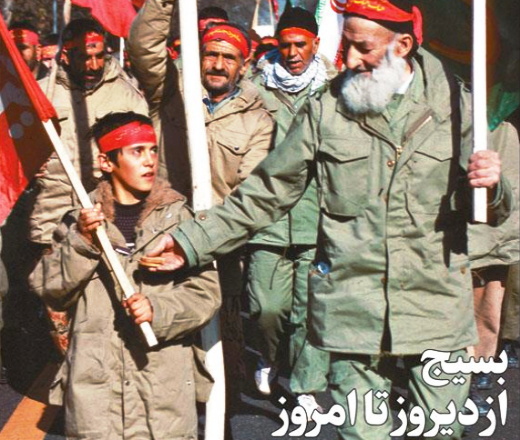In Iran November 21-27 marks the Week of Basij, a popular force which was formed on November 26, 1979 by order of the late Imam Khomeini. When Saddam’s Iraq waged war against Iran in 1980, Basij forces rushed to the battlefields to defend their homeland along with their comrades in arms at IRGC and the army. After the war, Basij got involved in yet another campaign to help the country pick up the pieces and rise above the conflict.
On November 29, Sharq newspaper released a supplement “Basij, Yesterday and Today” to mark the occasion featuring, among other things, the remarks of different political officials on the role of the Basij volunteer force during and after the war. What appears below is the translation – in part – of what Chairman of the Expediency Council Ayatollah Akbar Hashemi Rafsanjani, President Hassan Rouhani, Speaker of the Islamic Consultative Assembly Ali Larijani and Commander of the Basij force Brigadier General Mohammad Reza Naghdi, said in the supplement about the force:
Rafsanjani: Peacetime struggle for reconstruction
We can tap into the potential of Basij to solve any problem that arises in society. The organization of young volunteers can be a big help in efforts to mobilize people to get the job done.
Gratitude makes for a great attitude. We have used the force at high-stakes junctures in the past, now we should not forget them in peacetime when the going is not tough. […]
Rouhani: Basij should go beyond partisan agenda
[…] The great heroic Basij belongs to the whole nation. It belongs to no specific party. No one can cast a greedy eye on Basij. The volunteer force belongs to every single Iranians and all those who approve of the [Islamic] establishment, revolution, the Constitution and Velayat-e Faqih (the Governance of the Jurist). Iranians of every age are members of Basij. It belongs to all Iranians. […]
Basij is meant to safeguard national and Islamic interests. That means one can say that this country is home to some 75 million Basijis. […]
Larijani: Basij should pursue entrepreneurship to stimulate production
[…] The policies of the Resistance-based Economy championed by the Supreme Leader should be carried out. These policies primarily focus on ways of helping production boom and giving the public a bigger role to play in the economy.
The public economy has not been able to mobilize the country’s national potential; nor have the state-run companies been able to pull their own weight. However, Basij can do big jobs in this regard. […]
Entrepreneurship in the agricultural and industrial sectors in rural areas can empower the nation. If Basij is seeking to address the country’s serious challenge, it needs to take care of entrepreneurial efforts which will encourage and maximize production. […]
Naghdi: Basij is ready to cooperate with the government
[…] In religious democracy, people are not separated from the establishment and government, and they form an integrated whole. The government and its institutions have come from the fabric of society to serve the people. And all people should offer a helping hand when it comes to serving the public. […]
To cut through the red tape people involved in the agriculture and production sectors are tied up in, Basij can enter the scene, muster people and launch redoubled efforts to make the problem a thing of the past.
This mindset is what is usually lacking in governments, and it has nothing to do with where they stand, whether they follow right- or left-leaning doctrines. […]
